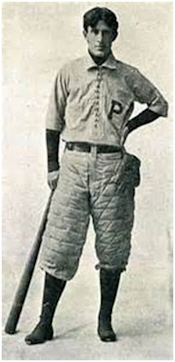Pearl, just like in Cash sang, "grew up quick and grew up mean." He described himself as a "juvenile delinquent." He hated school, was a poor student, and never graduated from high school. He constantly disobeyed his parents. He was a petty thief and engaged in countless fist fights. Pauly wrote that "[Pearl] hurled himself into combat with disturbing relish and ferocity, flinging stones without regard for potential injury." In one instance, he knocked a boy out with a rock; in another, he sent a boy "he toppled with a brick" to the hospital. On yet another occasion, he kicked a boy in the face whom he had just knocked to the ground. His irascible behavior, in his own words, led to "many a poignant acquaintance with the apple switch."
A number of psychological studies completed long after Pearl's death substantiate that "boys with girly sounding names have more behavioral problems," wrote Time's Bonnie Rochman. Jeanna Bryner in a 2010 LiveScience article reinforces Rochman's contention, claiming "research suggests [that] boys with names traditionally given to girls are more likely to misbehave than their counterparts with masculine names." Partly it is surmised that this misbehavior stems from these boys' insecurity, which drives them to constantly prove their masculinity.
Page 1
By Daniel Demers, DrBicuspid.com contributing writer

Continued Page 2
Courtesy of:


November 25, 2013 -- It's hard to fathom what kind of parents give their son a girl's name. Surely they can't be oblivious to the virtual certainty that the child will be forced to fight throughout his life, like the Johnny Cash song "A Boy Named Sue" proclaims. Such, though, was the case of Dr. Lewis Grey, who named his son "Pearl." Grey, an Ohio farmer, became a dentist in 1861 by apprenticing himself with an established dentist -- the professional norm at the time.
His son Pearl Zane Grey was born in 1872, the fourth of five children. According to anecdotal histories, the name was derived from newspaper accounts about the mourning attire of Queen Victoria's court after the premature death of her husband, Prince Albert. Regardless of its origin, the female name "caused [Pearl] much taunting and embarrassment," wrote Thomas Pauly, a professor of English at the University of Delaware.
The story of Pearl Grey: Dentist turned author, adventurer

Pearl Zane Grey
As Grey transitioned from adolescence, he discovered girls, which led to even more fights with protective brothers and jealous boyfriends. At 15 he was arrested in a police raid at a local brothel and spent a night in jail. Womanizing would become a lifelong affliction.
In his teens, he found an outlet to his wayward behavior in baseball and fishing -- two sports at which he excelled. Because of his father's financial setbacks, at 14 he found himself assisting in his dental offices. A year later, Grey was sent on his own into small rural towns outside of Columbus, OH, to perform basic extractions. His father trained him in the use of cocaine, a newly discovered alkaloid used as a topical numbing agent at the time.
According to Pauly, "rural Ohio was so sufficiently free of regulation that [Pearl] was able to practice dentistry" without the required license. At the same time, to avoid process servers and the shame associated with his financial reversals, his father changed the spelling of the family name from its original "Gray" to "Grey."
Pearl's baseball talent was noticed by several universities, including Ohio Wesleyan, Vanderbilt, and the universities of Michigan and Pennsylvania. He
E-MAIL ME ddemers901@sonic.net

